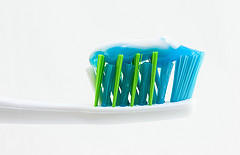Though you brush your teeth every single day, it can be difficult to tell if you’re really getting them as clean as they should be. Here are a few tips to learn how to brush your teeth properly.
- Brush for the right amount of time. In order to thoroughly clean all of your teeth, adults should brush for at least two minutes. Use a stopwatch if you aren't sure.
- Pay more attention to sensitive areas. Places like the gumline, fillings, crowns, and hard-to-reach back teeth require more brushing than the rest of your teeth, so give those areas special attention.
- Don’t forget the tongue. Brushing your tongue can make all the difference when it comes to having fresh breath, so give it a few quick swipes right before you rinse.
- Use the proper motion. Brush in short, gentle strokes and keep the toothbrush at a 45-degree angle to contact both the teeth and gums at once.
- Take care of your toothbrush. Your toothbrush is a breeding ground for germs, so dentists recommend replacing it once every three to four months. This prevents cold and flu viruses, cold sores, and even some common infections.
How to Brush [Colgate]
Proper Brushing [ADHA]
Am I Brushing My Teeth Correctly? [LifeHacker]
How to Brush Your Teeth [Crest]



 Equal Housing Opportunity
Equal Housing Opportunity